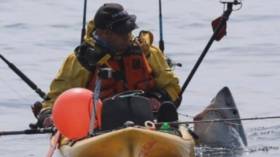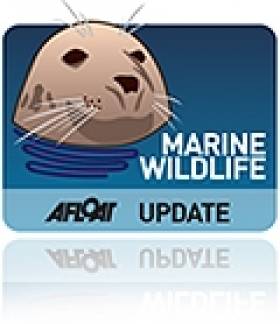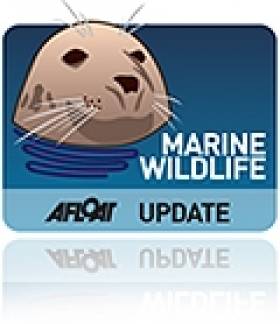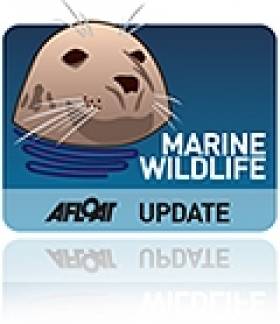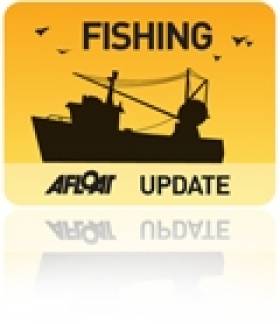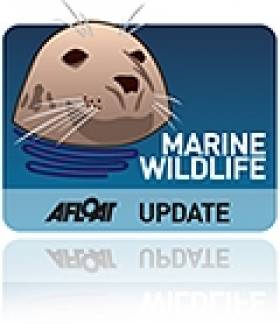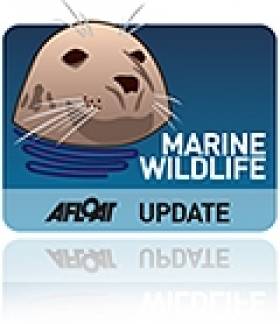Displaying items by tag: Shark
Angler Catches Shark in His Kayak off Donegal
After landing the huge fish, Mr Smith released it.
The experienced angler says it was "above and beyond" anything else he has experienced.
Ocean Discovery Reveals Life in The Sea Predates Dinosaurs
There is always something unusual in the sea, a phrase I have heard very often from marine scientists and which I have been known to utter myself. It comes to my mind time and again when I am preparing this fortnightly radio programme.
From somewhere in my educational background, most likely with the Presentation Brothers in Cork aeons ago, I became conditioned to believe in a world that was, seemingly, manufactured within a defined religious-approved period, but I did not conceive then as a youngster that this could have happened many, many millions of years back, before the period recognised by the Brothers who taught me a lot that I value today, but were less informative about the millions of years BC.
So, when I come across information about a new discovery in the ocean, dating back many millions of years ago, the dating of them still comes as a surprise to me. Perhaps that is reflective of my age, or rather maturity, which I prefer to regard it as – maturing … like a good wine!
Anyway, that phrase came back to me when collating the News review for the current edition of THIS ISLAND NATION and two stories which came from North America about discoveries going back those ‘millions of years ago’. They reported that sharks existed on Earth 300 million years ago and that was before the age of the Dinosaurs. The discoveries have been made by marine scientists in Texas and New Mexico. The fossil of a shark more than 8 metres long - that’s about 26 feet - and a quarter longer than the modern great white shark – has been found in Jacksboro, Texas, on what was the seabed of the Western Interior Seaway which covered Texas in water 300 million years ago. In addition to that, a nearly-complete fossilised shark that also dates to about 300 million years ago has been found during an archaeological dig in a quarry in New Mexico. A female specimen, this measures 6 feet, that’s around 2 metres, long.
It all shows that we still know less about the seas than we do about the Universe – and that’s something else which scientists say quite often!
Tope Shark Rescued in Rush
#shark – Locals in Rush, County Dublin have rescued up to 30 Tope shark that were stranded in shallow water after the tide had gone out. The shark were transferred back to deeper water in the back of a jeep as this youtube video describes.
Porbeagle Sharks Tagged & Tracked Online by Marine Institute
#shark – October 2012 marks an important milestone for the Marine Institute and Irish Elasmobranch Group's porbeagle shark tagging project as five more porbeagles have been tagged off the Donegal coast by the project's expert shark angler, Peter McAuley. The project, which has been ongoing since 2008, is now offering the public an opportunity to track the movements of two sharks in near real time on the Irish Elasmobranch Group's website, www.irishelasmobranchgroup.org.
Five sharks were tagged with conventional pop-up satellite tags, which will record the sharks' location and depth, over a nine month period. After this, the tags are programmed to detach, float to the surface and transmit the data to orbiting satellites. In addition to the pop-up tags, two of the tagged sharks were fitted with Smart Position or Temperature Transmitting (SPOT) tags. These tags are fitted on to the dorsal fin of the sharks and each time the fin breaks the water's surface, a position is transmitted to an orbiting satellite. This allows the sharks to be tracked in near real time and it is believed that this is the first time these tags have ever been fitted on porbeagles. The tags should function for at least the next year, providing a completely new insight into the behaviour of these sharks.
Porbeagle sharks, which are a very timid species of shark, can grow to over three metres and 250 kilograms, and are one of the largest predatory sharks in Irish waters, feeding on fish. Once the target of intensive commercial fishing, the porbeagle shark is now considered to be critically endangered in the northeast Atlantic by the International Union for Conservation of Nature (IUCN). Since 2010, fishing for porbeagles has been banned in European waters; however, as little is known about its biology or ecology, such effective conservation measures are difficult to implement. The research team, comprising Dr. Ryan Saunders, Dr. Maurice Clarke and Dr. Edward Farrell, are attempting to understand the biology and ecology of the porbeagle shark by using advanced satellite linked tagging techniques. The project has already yielded some very important results, the most notable of which was the tagging of one shark, a juvenile male, that migrated over 2400 km from Ireland to Madeira. The movement of porbeagles from European waters to African waters was previously unknown and it has important implications for the conservation and management of the species.
In 2011 the research team was successful in attaining funding from both the Swiss based Save Our Seas Foundation and the German based Naturschutzbund Deutschland (NABU) to continue the project and to build on the important findings already made. Given the large scale movements of porbeagles, collaborations were also developed with the Centre for Environment, Fisheries and Aquaculture Science (CEFAS) in the UK and with the French Research Institute for Exploitation of the Sea (IFREMER).
These five newly tagged sharks also need names so a competition is being organised in collaboration with Galway Atlantaquaria which will give school children the chance to name these five sharks. Details about the competition are available on the Irish Elasmobranch Group website.
Surfer Attacked By Shark - And Lives to Tell the Tale
#MARINE WILDLIFE - A Sligo-based surfer has relived the moment when he was attacked by a shark in his native New Zealand.
As the Otago Daily Times reports, 42-year-old Peter Garrett was surfing off Taranaki on North Island on Tuesday when the shark mauled him, leaving 10 bloody wounds - each about 2cm deep - with its razor-sharp teeth.
"He was bleeding quite a bit," said James Bruce, one of two vets surfing in the area who came to his aid. "You could tell from the teeth marks it could've been more serious."
Speaking to the Irish Independent from New Zealand, Garrett said he was knee-boarding at the time when he felt a bump to the board and a sudden sharp pain in his leg.
"I looked down and there was a shark on my leg and I sort of yelled obscenities at it... But it came back and I kicked at it with my flippers."
New Zealand has a relatively high incidence of unprovoked shark attacks, with some 44 on record since the mid 19th century - compared to 39 for the whole of Europe.
The Irish Independent has more on the story, including photos, HERE.
Shark Sighting in Olympic Waters off Perth
#PERTH2011 – First electrical storms now possible shark attacks! It's all happening for the Irish Olympic team seeking qualification at the Perth 2011 ISAF Sailing World Championships this week.
Aerial shark patrols over the sailing courses have been stepped up today after a credible sighting of a large shark in the Fremantle Fishing Boat harbour.
Event Director John Longley today briefed international sailing teams on the sighting late Tuesday, saying it was being taken seriously.
"The report was made by a professional fisherman who is regarded as a reliable source," Longley told sailing officials. "We have informed Western Australian government authorities who will ensure that the usual helicopter shark patrol will concentrate on checking out the Fremantle course area. Our course boats and the Fremantle Rescue Service will also be on extra alert after the reported sighting."
"The safety of athletes is paramount." Longley said. "This is part of the reason why we changed the racing rules for the Perth 2011 ISAF Worlds not to penalise sailors who need assistance to get back into their boats after a capsize."
More than 1100 sailors from 79 nations are taking part in the ISAF Sailing Worlds Championships being held between 3 – 18 December.
Higgins Asks EU for Progress on Shark Finning Laws
"Sharks are captured and their fins cut off before the remaining carcasses are thrown back into the sea. The practice was made illegal in the EU in 2003, but under the present regulations, Member States are able to issue special permits to exempt fishing vessels from the ban," the North West MEP explained.
Under the exemption, the weight of fins kept from the catch must not exceed 5% of the live weight of the shark catch. However, reports have found the fins of some shark species did not typically represent 5% of the live weight of a shark, creating a loophole that meant finning could take place unnoticed.
"Anti-finning campaigners want to see the adoption of a requirement that sharks be landed with their fins naturally attached to their bodies. It is an issue that needs to be addressed urgently and I would ask the Commission to update MEPs on their progress towards new legislation in this area which will completely outlaw shark finning," Mr Higgins added.
Globally, sharks are captured for their meat, fins, liver and oil. However, it is the fins that command high prices, fetching up to 300 euros/kg in Hong Kong.
Study Shines Spotlight on Starry Smooth-hounds
New research from University College Dublin on marine animals may bring closer attention to one of Ireland's least well known species of shark.
Dr Edward Farrell of UCD's School of Biology & Environmental Science spent the last four years of his PhD project studying the starry smooth-hound, a regular in the shallow waters of Ireland's east coast that can grow to over a meter in length.
"It's amazing how little was known about this species," said Farrell. "Until recently we weren't even sure what species we were dealing with, but we developed a genetic method which allowed us to confirm that it is the starry smooth-hound which occurs in Irish waters and not the related common smooth-hound."
Starry smooth-hounds are not valuable as a commercial species in Ireland, but are growing in popularity on the continent. Once abundant in the Mediterranean, their numbers have dwindled in recent years.
The sharks were previously considered a fast-growing species, meaning they were not a conservation concern. However Farrell's research has revealed that those in Irish waters actually grow twice as slowly as once thought, and only reproduce every two years rather than annually.
"There are currently no management measures for this species in European waters mainly due to the lack of biological information," said Farrell. "So our main aim was to gather the necessary data.
"Hopefully this can be used now to ensure their sustainability and prevent a repeat of the overexploitation seen in Mediterranean waters."
Satellite-Linked Tagging of Porbeagle Sharks
Scientists at the Marine Institute, Galway, are working with anglers around Ireland to study the migration and diving behaviour of porbeagle sharks (Latin name - Lamna nasus) in the northeast Atlantic. Porbeagle sharks are one of the top marine predators around Ireland, but very little is known about their movement patterns in the northeast Atlantic.
Like most pelagic sharks around the world, the porbeagle shark is vulnerable to fishing pressure due to its high commercial value, slow growth rate and complicated reproductive cycle. However, there is currently no protective legislation for the species, primarily due to a lack of basic information on its biology and ecology.
Marine Institute fisheries scientist Dr. Maurice Clarke said, "Understanding the biology and spatial ecology of the porbeagle shark is key to the conservation of the species and for establishing successful ecosystem-based management strategies in the northeast Atlantic".
To study the movement patterns of porbeagles, scientists are using pop-up satellite tags. These tags are fitted harmlessly to the back of the shark and collect information on the animals' location and depth distribution, together with data on the environment in which the sharks live. Then after nine months the tags pop-up to the surface and transmit the data to polar-orbiting satellites.
With help from expert shark angler, Peter McAuley, three tags were deployed off Downings, Donegal, in September 2008. These data have provided new insight into the migration and diving behaviour of porbeagle sharks around Ireland. One shark, a juvenile male, migrated over 2400 km to Madeira off the west coast of Morocco during the wintertime. Another shark migrated to the Bay of Biscay, a region that is considered a hotspot for other shark-like species such as albacore tuna. The results also showed that porbeagle diving behaviour is linked strongly to the day-night cycle and the monthly lunar cycle.
Daragh Brown of BIM commented that, "These results are really interesting and since there isn't a whole lot known about porbeagle behaviour or habitat preference, even small amounts of data can really advance our knowledge".
This year, Marine Institute scientists are hoping to tag large adult females to find out the location of porbeagle birthing grounds. Currently nothing is known about where these large predators give birth.
The Marine Institute is currently working with the Irish Elasmobranch Group, French Research Institute for Exploration of the Seas (IFREMER), and the Association for the Conservation of Sharks (APECS) to find further funding for the project that will end in 2011. They aim to establish links between the fishing industry, recreational anglers and the public to increase research and awareness for the conservation of these sharks.
Dr. Edward Farrell (Irish Elasmobranch Group) said, "Pelagic sharks have received much global attention recently. Given the increasing pressures that threaten their survival, there is a pressing need for new research to underpin effective management measures".



























